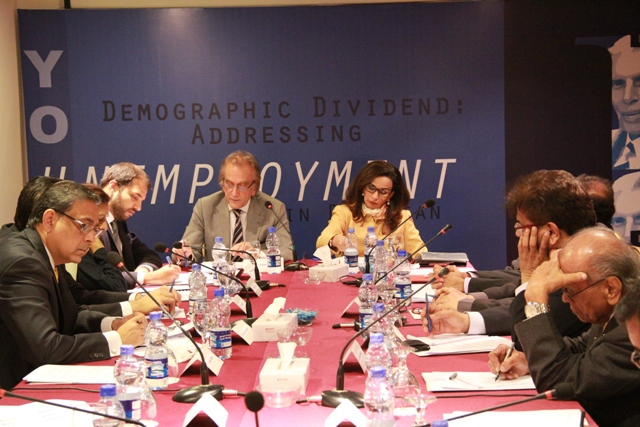Policy Events
Financial inclusion, entrepretaurship, demand based vocational training key for reducing unemployment in Pakistan
Date: January 29, 2015
January 28, 2014, Karachi: Unlocking capital, public-private partnerships for SMEs and vocational training, along with developing a national entrepreneurial strategy were recommended as policy interventions by experts from the private sector and academia at a roundtable on “Addressing Youth Unemployment in Pakistan”.
The event, organized by the Jinnah Institute, examined policy options for employment generation for Pakistan’s youth cohort, currently estimated to constitute up to 36 percent of the total labor force.
Chairing the session, President Jinnah Institute Sherry Rehman highlighted that creating equitable employment opportunities for youth poses one of the least addressed yet critical policy issues facing Pakistan. She noted that in the absence of incentives for employment through entrepreneurship and private sector led jobs, the already overburdened public sector continues to attract job expectations.
Former Governor State Bank Syed Salim Raza, stressed that the growth required to absorb Pakistan’s rising labor force remains inadequate. Some industries with higher growth rates, including financial sector, automobiles and FMCGs, also require higher level of skills and training, largely absent in the majority of working age population. He also noted that unlocking capital through progressive financial policies, including increasing mortgaged based lending, were key to providing finance for SME entrepreneurs.
Nadeem Hussain, CEO Tameer Microfinance Bank stressed that in the absence of adequate job creation by the public or private sectors, it is more important to enhance financial inclusion, which can help create greater opportunities for self-employment instead of salaried employment.
Saad Amanullah Khan from the Pakistan Innovation Foundation recommended five key areas for policy interventions: financial inclusion, robust government regulation, promotion of women entrepreneurship, awareness with regards to entrepreneurship and start-ups, and innovation driven employment models.
Shehnaz Wazir Ali, President SZABIST, observed that there remain several challenges with regards to technical and vocational training in Pakistan, with the gap between educational attainment and employable skills widening. She recommended that improving educational attainment and scaling demand driven vocational training through public-private partnerships were necessary to decrease unemployment.
Ahsan Jamil, CEO Aman Foundation suggested public-private partnership models being undertaken by the AMAN Foundation for skills enhancement and vocational education. He added that there is now greater private sector engagement in promoting skills training for younger people in the country, but government support for scaling such models was essential.
Other speakers highlighted the need for using technology to drive growth, supporting innovation based models for entrepreneurship and adopting global best practices for SME development. The roundtable was attended by Ava Cowasjee, Jamal Mir, Awab Alvi, Dr. Imran Ali, Moin Fudda, Dr. Salima Ahmed, Ahsanullah Khan, Zeenia Shaukat, and Samir Amir.
Coverage: Express Tribune

